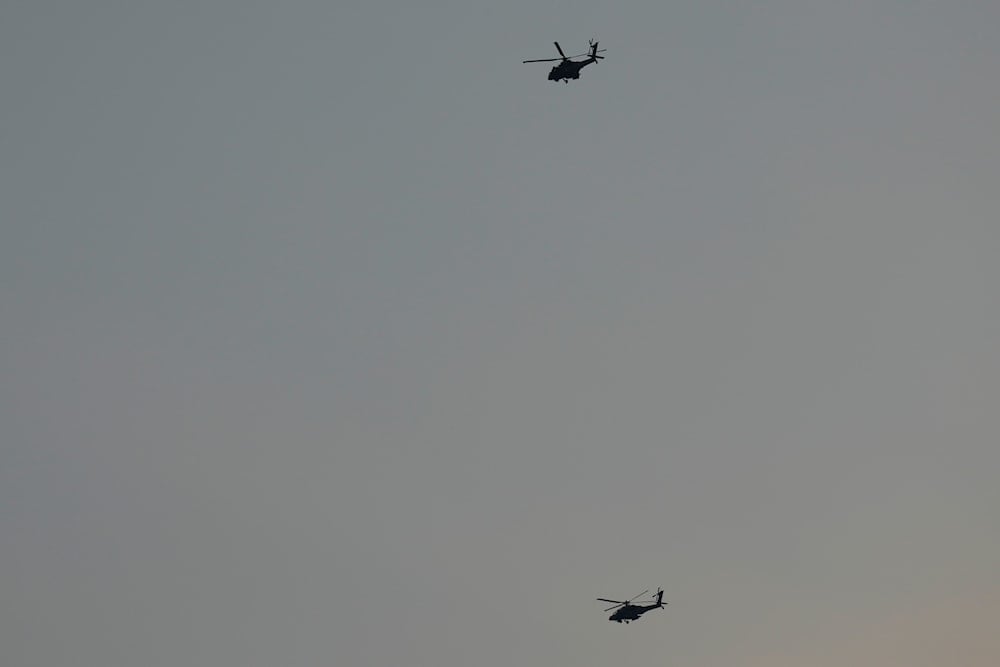'Israel' suspends flights, closes beaches following Hezbollah strike
The Israeli occupation's northern front is on high alert following the Hezbollah strike carried out in retaliation for the assassination of martyred commander Fouad Shokor.
-

Israeli Apache helicopters fly toward northern occupied Palestine, Sunday, August 25, 2024. (AP)
A wave of panic and concern has swept across the Israeli occupation following a series of military operations launched by the Islamic Resistance in Lebanon - Hezbollah in direct retaliation for the Israeli occupation's recent aggression on Beirut's southern suburb and the assassination of senior commander Fouad Shokor.
In response to Hezbollah's sweeping military operations, Israeli authorities swiftly imposed a series of restrictions across occupied Palestine.
The measures in question span from the Lebanese border to the central region of Gush Dan, encompassing Greater Tel Aviv, the northern and southern occupied Golan Heights, al-Jalil, the Jordan Valley, and Carmel, as reported by Israeli media outlets.
The situation has also significantly impacted air travel, with scheduled flights to and from Tel Aviv being delayed. Furthermore, Ben Gurion Airport, the Israeli occupation's primary international gateway, has been shut down for both landings and take-offs due to escalating security concerns.
The security alert extends beyond the skies, as beaches in the occupied city of Haifa have been closed to Israeli settlers. This decision was taken to ensure public safety amid the heightened tension, according to Israeli Channel 12.
The Israeli security cabinet convened an emergency meeting this Sunday morning, while the weekly government meeting, originally planned for today, was postponed in light of the ongoing security threats.
Hezbollah's retaliation
The Islamic Resistance in Lebanon – Hezbollah launched an "initial response" to the assassination of Commander Martyr Fouad Shokor at dawn Sunday, on the anniversary of Imam Hussein's Arbaeen, by launching a large number of drones deep into the occupied Palestinian territories.
In a statement, the Resistance clarified that the attack targeted a strategic Israeli military site, adding that details about the specific target "will be disclosed at a later time."
Simultaneously, the Resistance struck multiple sites, military barracks, and Iron Dome installations belonging to the occupation forces in northern occupied Palestine with a heavy barrage of missiles.
Hezbollah further stated that these military operations will continue for some time, with a comprehensive statement to be issued afterward, detailing the course and objectives of the operations.
The Resistance concluded its statement by emphasizing that it remains at the highest level of readiness, prepared to respond decisively to any Israeli transgression or aggression, and warning against severe and harsh consequences, particularly if civilians are targeted.
In its statement, Hezbollah confirmed that it had successfully completed the first phase of its response to the assassination of Martyr Shokor.
In this phase, Hezbollah targeted Israeli barracks and sites to facilitate the passage of attack drones towards their intended target deep within the occupied Palestinian territory. The drones successfully reached their destination as planned, according to the statement.
Secondly, the statement confirms that the number of Katyusha rockets fired exceeded 320, targeting enemy positions.

 4 Min Read
4 Min Read








